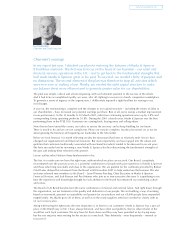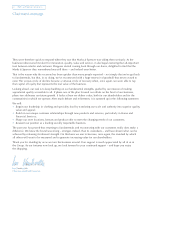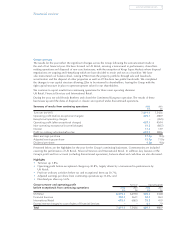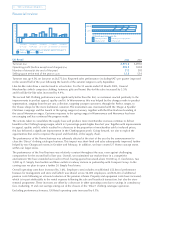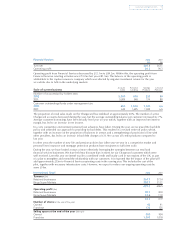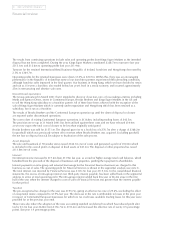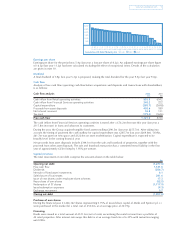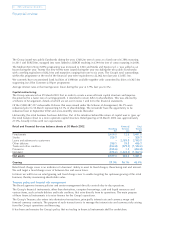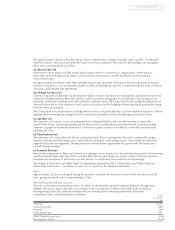Marks and Spencer 2002 Annual Report Download - page 13
Download and view the complete annual report
Please find page 13 of the 2002 Marks and Spencer annual report below. You can navigate through the pages in the report by either clicking on the pages listed below, or by using the keyword search tool below to find specific information within the annual report.
Corporate governance
The Group is committed to high standards of corporate governance and has applied the Combined Code principles
as follows:
Directors
As at 30 March 2002 the Board comprises 11 directors, five of whom are non-executive. In addition, from 2 April
2002 Paul Myners joined the Board as a non-executive director. Since September 2000 when Peter Salsbury resigned
from the Board as Chief Executive, Luc Vandevelde has headed the Board as Chairman and Chief Executive. The
Board recognises that this is to address current business needs and has balanced the power by:
•appointing Roger Holmes as Managing Director of UK Retail, and Laurel Powers-Freeling as Chief Executive
of Financial Services;
•the Board comprising 50% non-executive directors, with a wide range of experience and expertise, who bring
an independent judgement on issues of strategy, performance and resources; and
•retaining 100% non-executive membership of the principal Corporate Governance Committees
(Audit, Remuneration and Nomination).
A full list of the directors, along with their biographies and the Board Committees on which they sit, is given on
page 20 of the Annual Review. Brian Baldock is the Senior Independent Director. All non-executive directors are
considered independent.
All directors have access to the advice and services of the Company Secretary, Graham Oakley, who ensures that
the Board, which meets at least eight times per year, receives appropriate and timely information for its decision
making, that Board procedures are followed and that statutory and regulatory requirements are met. He also assists
the Chairman in ensuring that all directors are properly briefed on issues arising at Board meetings. Directors receive
appropriate induction training when they join the Group and coaching to develop individual skills as required.
There is an established procedure whereby any director, wishing to do so in the furtherance of his or her duties,
may take independent professional advice at the Group’s expense.
Under the Company’s Articles of Association, the nearest number to but not exceeding one third of the Board shall
retire each year by rotation and all directors are required to offer themselves for re-election at least every three years.
Principal Board committees
The Board has a formal schedule of matters reserved to itself. The Board has delegated certain responsibilities to Board
Committees, which operate within clearly defined terms of reference, reporting regularly to the Board and include:
Audit Committee: assists the Board in fulfiling its overview responsibilities, primarily reviewing the reporting of
financial and non-financial information to shareholders, the systems of internal control and risk management, and the
audit process. It comprises five non-executive directors, is chaired by Kevin Lomax and meets at least three times
annually. The external auditors and the Chief Internal Auditor attend all meetings.
The Financial Services division has its own Audit and Compliance Committee which meets three times a year, reports
regularly to the Financial Services Board and the Group Audit Committee.
The Audit Committee also keeps under review the independence and objectivity of the external auditors.
The Committee reviews the nature and amount of non-audit work undertaken by PricewaterhouseCoopers (‘PwC’)
each year to satisfy itself that there is no effect on their independence. In some cases the nature of the advice may
make it more timely and cost-effective to select PwC who already have a good understanding of the Group. PwC may
also be appointed for consultancy work but only after rigorous checks to confirm they are the best provider, including
competitive tender. PwC are also subject to professional standards which safeguard the integrity of the auditing role
they perform on behalf of our shareholders. Details of this year’s fees are given in note 4 on page 33.
Remuneration Committee: ensures the executive directors and senior management are appropriately rewarded,
giving due regard to the financial and commercial health of the Group. It comprises four non-executive directors,
is chaired by Dame Stella Rimington, and meets at least five times annually. The Remuneration Report appears on
pages 14 to 20 and contains a statement of remuneration policy and details of the remuneration of each director.
www.marksandspencer.com 11


